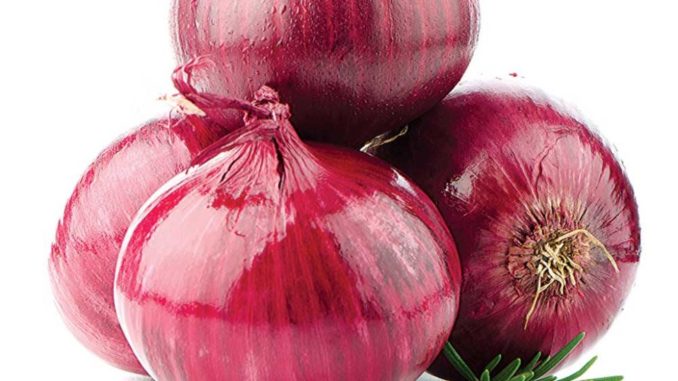
A recent review and meta-analysis have investigated whether a plant pigment called quercetin could reduce the risk of cardiovascular disease. In particular, the authors identified that quercetin reduced blood pressure.
A compound that occurs naturally in a range of fruits and vegetables, including red onion, may help reduce blood pressure.
Globally, cardiovascular disease is responsible for about 17.3 million deaths each year. As the population’s average age increases, experts expect cardiovascular disease to rise in step.
Researchers have identified a range of lifestyle factors that increase the risk of cardiovascular disease, such as poor diet, low physical activity, smoking, and consuming alcohol. Certain biological markers, including high blood pressure, raised serum lipids, and high blood glucose levels, also predict cardiovascular disease.
Although lifestyle and medical interventions benefit most individuals, they do not work for everyone. For this reason, some researchers are focused on identifying novel ways to reduce cardiovascular risk.
Introducing quercetin
Researchers from Dongguan Shilong People’s Hospital of Southern Medical University in China are interested in quercetin. Quercetin is a flavonoid that naturally occurs in a range of foods, including vegetables, fruits; wine, nuts, red onions, kale, and black tea.
According to the authors of the recent review, “Accumulating evidence indicates that quercetin possesses protective anti-inflammatory as well as antioxidant effects and may be useful in treating a myriad of chronic conditions.”
However, despite some encouraging results, human studies — rather than animal studies or experiments on tissues — have produced inconsistent results. To date, researchers have carried out few meta-analyses to examine the pooled findings of these studies.
To address this issue, the authors of the current paper analyzed studies that investigated quercetin’s influence over a range of cardiovascular risk factors, including blood pressure, lipid profiles, and glucose levels. They published their findings in the journal Nutrition Reviews.
In their analysis, the scientists only included research papers that met certain criteria. All of the studies were randomized placebo-controlled clinical trials that had investigated the effect of quercetin for two weeks or more and had involved adults.
The scientists identified 17 relevant papers, which involved a total of 896 participants. The studies took place in six countries: Iran, United States, United Kingdom, Germany, Italy, and Korea.
Overall, they identified no significant effect of quercetin on glucose levels or lipid profiles. However, when they only analyzed data from trials that used a parallel design and lasted eight weeks or longer, quercetin did appear to improve levels of high-density lipoprotein (HDL or “good”) cholesterol and triglycerides.
A study with a parallel design is one in which researchers compare two or more treatments; for instance, comparing the effects of quercetin against those of a control.
The greatest benefit of quercetin, however, was its effect on blood pressure. The findings showed that quercetin lowered both systolic and diastolic blood pressure. The authors write: “The main conclusion was that dietary intake of quercetin significantly lowered [blood pressure].”
Systolic blood pressure is the pressure in the arteries as the heart contracts, and diastolic blood pressure is the blood pressure when the heart is resting between beats. As an example, if someone’s blood pressure is 120/80 millimeters of mercury (mm Hg), the first number refers to systolic pressure, and the second number denotes diastolic pressure.
On average, quercetin reduced systolic blood pressure by 3.09 mm Hg and diastolic blood pressure by 2.86 mm Hg.
The authors explain “a reduction in [blood pressure] of more than 10 mm Hg lowers cardiovascular risk by 50 per cent for heart failure, by 35–40 per cent for stroke, and by approximately 20–25 per cent for myocardial infarction.”
The authors believe that “the favorable effects of quercetin on [blood pressure] found in the current investigation support the use of quercetin as an adjunctive therapy in patients with hypertension.”
In other words, quercetin might enhance the benefits of taking hypertension medication and making lifestyle changes, thus helping reduce cardiovascular risk.
As the authors explain, the results are not yet conclusive, and many questions remain. They note that the changes in blood pressure varied depending on the type of quercetin formulation and how long the trials lasted.
The authors also noticed substantial differences among the findings of the studies. These differences might be, in part, due to the size of the trials in the analysis: Four of the 17 trials included fewer than 30 participants.
There were also differences in the design of the studies and the age, sex, and body mass index (BMI) of the participants. These differences make it difficult to generalize and compare among experiments.
Overall, the results are promising, but scientists need to conduct larger, longer-term clinical trials before they can confirm the full benefits of quercetin. If the compound eventually proves to reduce cardiovascular risk, it could benefit vast swathes of the population.
END

Be the first to comment